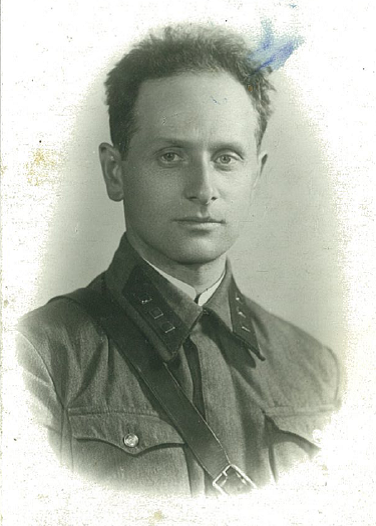Pinie (Pinkhas) Frumkin was born in 2011 in Petrikov, Belorussian Polesia, as the second son of the melamed (religious teacher) Shmuel Frumkin. In the late fall of 1916, at the beginning of the freezing of the rivers, his father's pupils tried to cross the Pripiat River on thin ice and fell into the freezing water. The melamed rushed to save them and succeeded in doing so. However, as a result of his effort, he fell ill and died. Pinie and his elder brother Iosif were then taken care of by their grandfather. The latter was regarded as well-off because he had two cows. He and his three unmarried daughters produced butter and cheese. The year 1920 in Polesia saw a phenomenon that was called to in Soviet political parlance as "political banditry." Regardless of the identity of these "political bandits", Jews were their first and foremost victims. However, Pinie's grandfather and his enlarged family were more fortunate than many other Polesian Jews since the "bandits" did not kill them but only took away their cows.
When Pinie was nine, he was sent to an orphanage. There he acquired a good profession, that of a typesetter. His first real job when he left the orphanage was at the typography of the Central Committee of the Belorussian Communist Party in Minsk. Later, he moved to Leningrad and studied at the Leningrad Publishing and Printing College. That was where he joined the Communist Party.
In 1939, Pinkhas Frumkin was drafted for the Soviet-Finnish war as a political commissar. At the beginning of the Soviet-German war in June 1941, he was a publisher of the newspaper of the 177th Riflemen's Division, which was to take part in the defense of Leningrad in the summer and fall 1941. During the first stage of the war, he served as a political commissar (politruk) in his division.
In the fall of 1941, the survivors of the 177th Division were encircled by the Germans south of Leningrad. Frumkin was one of the ca. 600 men of this division who succeeded in breaking out of encirclement. He arrived in besieged Leningrad, where he was attached to a special riflemens' brigade as a political commissar and sent to the Volkhov Front. There the situation was nearly catastrophic. Frumkin was wounded and, having lost much blood, arrived unconsciousness at a military hospital. There it became clear that he had lost the politruk's special case with documents and maps. Because of this, after he recovered, Frumkin faced a court martial. Fortunately, he was acquitted, but he was demoted from political commissar to private and was sent to the 2nd Shock Army commanded by General Andrei Vlasov.
In the winter of 1942, Frumkin was mainly engaged in fortification work: under enemy fire and was suffering from lack of food, together with the other soldiers. After the war, he recalled that in the 2nd Shock Army he had encountered antisemitism that was incited by German propaganda:
"The Germans brought loudspeakers close to the front. They played Russian folk songs, and then a female voice gently said, 'Ivan, Vanya, look at who you are fighting for: for the Jews and commissars, for Leib Mekhlis and Lazar Kaganovich. Stick your bayonet into the ground, return home, and I will hug you so warmly, kiss you...' And this Vanya, who was lying prostrate under a hail of bombs in a nearby, water-filled bomb crater, direct coarse curses at both the German pilots and the Jews."
As is well known, in July 1942 Vlasov was captured by the Germans and agreed to collaborate with them (In fact, he was the most widely known Russian collaborator with the Nazis during World War II). There is not much doubt what would have been the fate for the Jew and a (former) commissar Pinkhas Frumkin, if he had been captured together with Vlasov. However, during the previous May he was wounded in the head, and no longer engaged in combat. The sole military award he received was the medal "For Courage."
After his second stay in a military hospital, Frumkin was recommended for promotion to the rank of captain (which he declined) and service guarding a camp of the GULAG (which he accepted). Thus, in Siberia far from the front, he served as a camp guard until the end of the war.
After the war, Frumkin worked at various printing and publishing houses. He died in 1981 in Leningrad.







